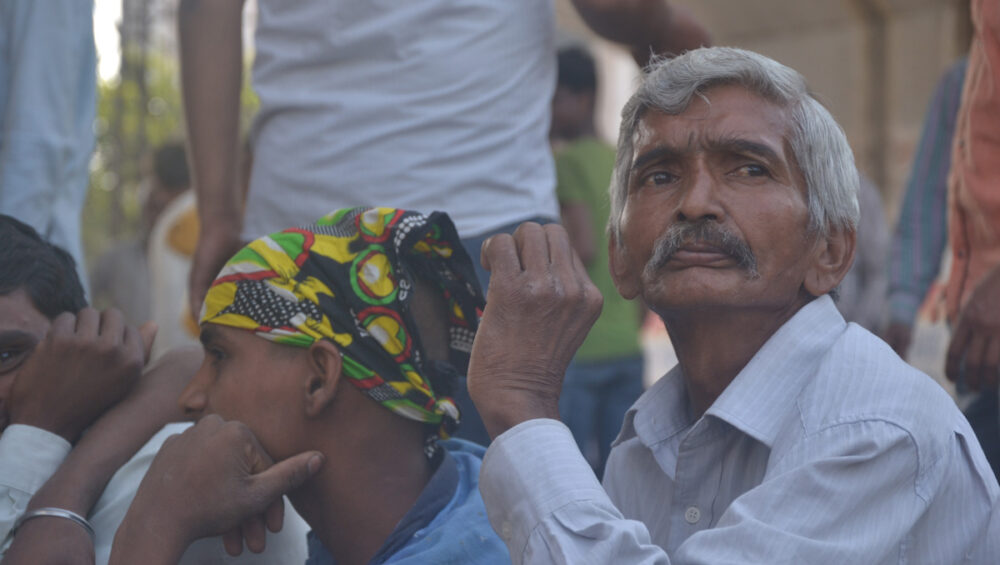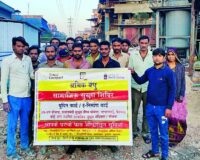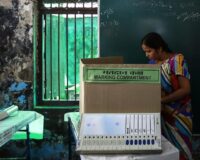State led initiatives
- As part of the Iconic Week from March 7 to 13, the Ministry of Labour and Employment celebrated 25 crore registrations under e-Shram on UMANG app, a Job Fair by the National Career Service Centers, placement drives, placement camps with a special focus on persons with disabilities and those from SC/ST communities.
- The government aims at doubling the number of apprentices to one million by the end of the year through multiple measures like creation of a unified portal, doing away with stipend proof as part of the National Apprenticeship Promotion Scheme 2016.
Social Security
- Donate- A-Pension initiative- Bhupender Yadav, the Union Labour and Employment Minister launched this initiative as part of the Pradhan Mantri Shram Yogi Maan-Dhan (PM-SYM) where “citizens can donate the premium contribution of their immediate support staff such as domestic workers, drivers, helpers etc” he tweeted.
- An RTI revealed that less than 12% of hospitalised patients were treated for free under the Ayushman Bharat scheme even though the Pradhan Mantri Jan Aushadhi Yojana (PMJAY) makes it possible for economically underprivileged cardholders to access medical procedures and diagnostic tests for free up to a limit of Rs. 5 lakhs. At least 40% of India’s population is eligible for this scheme and over 23,000 government and private hospitals are empanelled under the scheme
- The Central Board of Trustees of the Employee’s Provident Fund Organisation on March 12 proposed the lowering of interest rates for subscribers on the retirement savings scheme from 8.5% to 8.1%. This is the lowest interest rate on EPF deposits in four decades. This decision is expected to hit the earnings of over 60 million EPFO subscribers and was taken despite opposition from trade unions.
- The standing committee on labour has suggested that the labour ministry and the finance ministry must increase the minimum pension to Rs. 2000 from the current monthly pension of Rs. 1000 under the Employees Pension Scheme, 1995 as the current pension amount is inadequate. It has also suggested that the EPFO must assess its current pension schemes to revise the monthly pension amount to its members. The Ministry of Finance has not agreed to any such enhancement in the minimum pension beyond the monthly amount being paid currently at Rs. 1000.
Labour law violations
- In March alone, at least 14 people died in sewer lines in different parts of the country, many of whom were found to be without protective gear. Activist Bezwada Wilson of the Safai Karmachari Andolan appealed to the National Human Rights Commission to direct the district magistrate to take actions and arrest the culprits.
- In Gharuheda industrial area in Revadi, Haryana 105 contractual workers were laid off. They found out only after reading notices pasted on the company gate which were guarded with heavy police presence. The workers started protesting this decision of the company officials and demanded that the officials and the government take cognisance of this issue.
Worker-led struggles
- Central trade unions called for a nationwide strike on March 28 and 29 observed across the country with demonstrations, strike actions and protests by workers from different sectors. The two day strike had been called by a joint forum of ten trade unions against the “anti-worker, anti-farmer, anti-people and anti-national policies”. Their demands included:
- Scrapping changes to the labour laws
- Reversing privatisation of industries
- Scrapping the National Monetisation Pipeline
- Increased allocation under MGNREGA
- Regularisation of contract workers
The unions maintained that On the second day of the strike alone, over 30,000 government employees boycotted work. These workers are from banking, steel, oil, telecommunications, coal, postal, income tax and insurance sectors. Although the strike demands were raised by the Opposition in the Parliament, the issues were only briefly mentioned.
- Delhi’s anganwadi workers and helpers organised under the Delhi State Anganwadi Workers and Helpers Union were on strike from January 31 and called off their strike on March 9. The strike ended after the government issued a prohibition of the strike and invoked the Essential Services Maintenance Act. The Delhi High Court ordered the Delhi government to not issue termination orders after 3,000 show-cause notices were issued and 150 workers and helpers received termination orders. The matter will be heard next on April 13. Their main demands were raising the wages for workers and helpers, recognising their contribution as workers and not volunteers and providing them social security schemes.
- Following a Kerala High Court order restraining workers’ unions in Cochin Refinery, Bharat Petroleum Corporation Ltd (BPCL), going for a strike on March 28 and 29, the Centre of Indian Trade Unions released a statement on Saturday registering its protest. The statement called the High Court order ‘blatant’ and appealed to the court to recede the order.
Platform work and gig work
- Food delivery giant Zomato introduced a 10-minute food delivery service under “Zomato Instant” which has been criticised widely for the road safety risk it poses and the undue pressure on its employees.
- Delivery partners of Zomato held a protest in Chennai on March 20 against increasing working hours, low wages and other forms of exploitation. The workers demanded social security and welfare measures, permanent jobs and social welfare measures.
Labour cases
- The Supreme Court declared that the employer is liable to pay compensation on the death of a workman and the interest on the same would also be levied from the date of demise. The verdict was given in the context of the death of a breadwinner who died of a snake bite while cutting sugarcane and neither the contractor nor the sugar factory paid the worker.
- The Supreme Court ruled that the employer must pay damages for delay in payment of EPF contribution while hearing an appeal filed against the Karnataka High Court judgement which also held the employer responsible for failing to pay damages.
Updates from the Union Budget, February 2022
- The Pradhan Mantri Garib Kalyan Yojana which makes provisions for Covid relief package has not been extended beyond March 2022
- During the budget speech, the Finance Minister reiterated that the government is committed to enumerating unorganised sector workers. She also announced that a portal for collecting information on gig workers, building and construction workers will be formed to ensure the policies on health, insurance, housing, skills, food schemes are all benefiting migrant workers.
- The National Apprenticeship Promotion Scheme will be realigned to provide post-education apprenticeship, and training of graduates and diploma holders.
- The MGNREGA has not seen an increase in budgetary allocation, lower than the revised estimate for last year. This could have a significant impact on migration to cities in search of jobs and the unemployment crisis due to the pandemic.
- The informal sector which employs more than 80% of the workforce has not been mentioned in the budget
-Written by T. Lalita, who currently interns at Aajeevika Bureau‘s Bangalore office and edited by Kavya Bharadkar and Divya Varma from Aajeevika Bureau
फ़ैक्टरी में दुर्घटना से हुई मौत – जिम्मेदार कौन?
मजदूर मालिक या मशीन?
कामगार दर्शन हर दिन की तरह 16 फरवरी 2021 को भी पिपोदारा इंडस्ट्रीज के टेक्सटाइल कंपनी में काम करने गए। कार्य स्थल पर वो मशीन के ऊपर काम कर रहे थे। दर्शन नाइट शिफ्ट में थे और अचानक एक मशीन खराब हो गयी, जिसे सुधारने की कोशिश में रात को 2 बजे उन्हें मोटर के बेल्ट का झटका लगा और उनकी गर्दन एवं हाथ मोटर में आ गया, इससे उनकी उसी वक़्त मौत हो गई।
उस वक़्त काम कर रहे साथी कामगारों ने तुरंत फ़ेक्ट्री के मालिक को संपर्क करके खाते पर बुलाया। मालिक ने आते ही मदद करने के बदले मामले को रफादफा करने की कोशिश की तो साथी कामगारों ने उनका विरोध किया। इसपर मालिक ने तुरंत पुलिस को बुला लिया। इससे नाराज़ होकर यूनिट में काम करने वाले सभी कामदारों ने यूनिट बंद कर दिया।
इस घटनाक्रम की जानकारी बाबुभाई (जो पिपोदरा की इंडस्ट्री में प्रवासी श्रमिक सुरक्षा मंच (PSSM) के सक्रिय सदस्य हैं) उन्होंने आजीविका ब्यूरो के साथी सिबा मालिक को दी। जो जानकारी मिलते ही सिबा मालिक पिपोदारा में घटना स्थल पर गए। प्राथमिक जांच में ही पता चल गया की उस कामगार की मशीन के बेल्ट में सिर आने और गला दब जाने की वजह से मौत हुई है। PSSM के साथियों एवं मृतक के गाँव वालो द्वारा मृतक के परिवार को उचित मुआवजा देने के बाद ही वहां से लाश को हटाने की जिद्द की गई।लेकिन पुलिस की मध्यस्थता से मालिक एवं उनके साथियों ने उसी दिन मुआवज़ा देने का आश्वासन दिया। PSSM के सदस्य एवं मृतक के रिश्तेदार जहां 15 लाख मुआवज़े की मांग कर रहे थे वहीं मालिक का मानना था कि मौत कामगार की अपनी लापरवाही से हुई है इसलिए वो परिवार को सिर्फ डेढ़ लाख रुपये ही देंगे।इसके विरोध में कामगार फ़ेक्ट्री के बाहर धरना देकर बैठ गए।
इसके बाद PSSM एवं मृतक कामगार के रिश्तेदारों ने दूसरी मांग रखी जिसमें मुआवज़े की राशि को 8 लाख रखना तय किया।अंत में PSSM की तरफ से सिबा मालिक, बाबुभाई और 2 मालिकों ने एक बार फिर चर्चा की और मृतक के परिवार को साढ़े चार लाख रुपये देना तय किया। यह राशि सीधे मृतक की पत्नी के खाते में ट्रान्सफर कर दिए गए।
इस तरह एक श्रमिक की बेशकीमती जान की कीमत सिर्फ साढ़े चार लाख तय की गयी।
*मजदूर का नाम बदल दिया है उनकी पहचान को सुरक्षित रखने के लिए।
यह लेख शरद झगड़े द्वारा लिखा गया है और आभा मिश्रा द्वारा संपादित है। शरद आजीविका ब्यूरो के सूरत केंद्र से जुड़े हैं। आजीविका ब्यूरो द्वारा संचालित लेबर लाइन का काम देखते और कानूनी मामलों मैं मध्यस्थता की भूमिका निभाते हैं। शरद, सूरत टीम से जुड़े साथी – सिबा मालिक, संजय पटेल, अश्विन वदतिया के प्रति और PSSM के सदस्यों के प्रति शुक्रगुजार हैं। प्रवासी श्रमिक सुरक्षा मंच (PSSM) ये पावर लूम मैं काम करने वाले मजदूरों का संगठन है।






